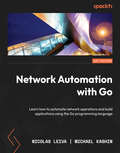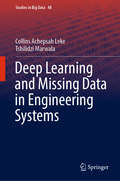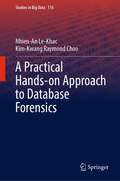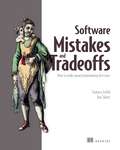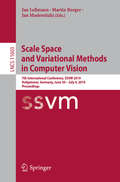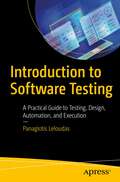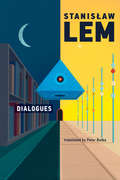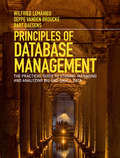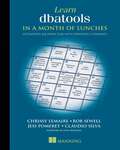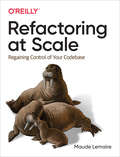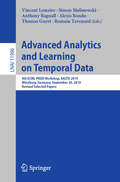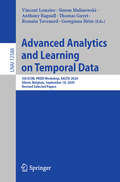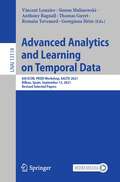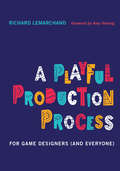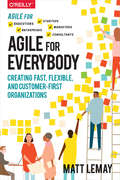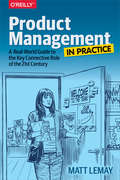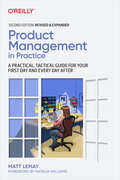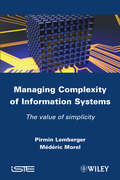- Table View
- List View
Artificial Economics and Self Organization: Agent-Based Approaches to Economics and Social Systems (Lecture Notes in Economics and Mathematical Systems #669)
by Stephan Leitner Friederike WallThis volume presents recent advances in the dynamic field of Artificial Economics and its various applications. Artificial Economics provides a structured approach to model and investigate economic and social systems. In particular, this approach is based on the use of agent-based simulations and further computational techniques. The main aim is to analyze the outcomes at the overall systems' level as results from the agents' behavior at the micro-level. These emergent characteristics of complex economic and social systems can neither be foreseen nor are they intended. The emergence rather makes these systems function. Artificial Economics especially facilitates the investigation of this emergent systems' behavior.
Network Automation with Go: Learn how to automate network operations and build applications using the Go programming language
by Nicolas Leiva Michael KashinUnderstand the world of modern network automation with Go and deepen your knowledge with insights from 10+ experts who have real-world hands-on experience with network automation and/or are using Go for network-related tasksKey FeaturesA comprehensive guide to the world of modern network automationUse Go to build anything from repetitive task automation to complex distributed systemsOver 30 practical, ready-to-use sample programsBook DescriptionGo's built-in first-class concurrency mechanisms make it an ideal choice for long-lived low-bandwidth I/O operations, which are typical requirements of network automation and network operations applications. This book provides a quick overview of Go and hands-on examples within it to help you become proficient with Go for network automation. It's a practical guide that will teach you how to automate common network operations and build systems using Go. The first part takes you through a general overview, use cases, strengths, and inherent weaknesses of Go to prepare you for a deeper dive into network automation, which is heavily reliant on understanding this programming language. You'll explore the common network automation areas and challenges, what language features you can use in each of those areas, and the common software tools and packages. To help deepen your understanding, you'll also work through real-world network automation problems and apply hands-on solutions to them. By the end of this book, you'll be well-versed with Go and have a solid grasp on network automation.What you will learnUnderstand Go programming language basics via network-related examplesFind out what features make Go a powerful alternative for network automationExplore network automation goals, benefits, and common use casesDiscover how to interact with network devices using a variety of technologiesIntegrate Go programs into an automation frameworkTake advantage of the OpenConfig ecosystem with GoBuild distributed and scalable systems for network observabilityWho this book is forThis book is for all network engineers, administrators, and other network practitioners looking to understand what network automation is and how the Go programming language can help develop network automation solutions. As the first part of the book offers a comprehensive overview of Go's main features, this book is suitable for beginners with a solid grasp on programming basics.
Artificial Intelligence and Its Applications: Proceeding of the 2nd International Conference on Artificial Intelligence and Its Applications (2021) (Lecture Notes in Networks and Systems #413)
by Brahim Lejdel Eliseo Clementini Louai AlarabiThis book contains the proceedings of the second edition of the international Conference on Artificial Intelligence and its Applications (AIAP'21). This edition aims to bring together leading academic scientists, international researchers, and practitioners to exchange and share their experiences and research results on all aspects of Artificial Intelligence. It also provides an interdisciplinary platform for researchers, practitioners and students to present and discuss the most recent innovations, trends, and concerns as well as practical challenges encountered and solutions adopted in the fields of Artificial Intelligence. This international conference offers an opportunity to bridge the gap between the Artificial Intelligence research community and people from the industry or working in other research areas including smart cities, big data, cloud computing, social networks, and energy.
Consumer Activism: Promotional Culture and Resistance
by Eleftheria J Lekakis"A crucial intervention to both critical studies of consumption and research into activism. It authoritatively explores the complex and multiplying links between branding and neoliberal culture, consumer practices and social justice." – Professor Mehita Iqani, Stellenbosch University "Eleftheria Lekakis reminds us that as consumers, we can do much more than just buy our way out of social or political problems." – Professor Melissa Aronczyk, Rutgers University Consumption and resistance are entwined. From buying fair-trade, to celebrity advocates for social causes, to subvertising and anti-consumerist grassroots movements, consumer activism is now a key part of our fight for social and environmental justice. This book is a comprehensive exploration of the complexities and dilemmas of using the marketplace as an arena for politics. It goes beyond simply buying or boycotting to critically explore how individuals, collectives, corporations and governments do politics with and through consumption. Impassioned and always accessible, Eleftheria Lekakis explores: The media and economic logics which privilege elite activists. The real opportunities to resist and redirect promotional culture. Consumer activism as collective and community-building. The politicisation of celebrity influencers. The centrality of digital media technology. A range of transnational case studies pushing the field beyond the Global North. Consumer Activism: Promotional Culture and Resistance covers the full breadth of theory and practice you need to know. It is an essential resource for understanding, researching and engaging with the global phenomenon of consumer activism. Dr Eleftheria Lekakis is senior lecturer in Media and Communications at the School of Media, Arts, and Humanities at the University of Sussex.
Consumer Activism: Promotional Culture and Resistance
by Eleftheria J Lekakis"A crucial intervention to both critical studies of consumption and research into activism. It authoritatively explores the complex and multiplying links between branding and neoliberal culture, consumer practices and social justice." – Professor Mehita Iqani, Stellenbosch University "Eleftheria Lekakis reminds us that as consumers, we can do much more than just buy our way out of social or political problems." – Professor Melissa Aronczyk, Rutgers University Consumption and resistance are entwined. From buying fair-trade, to celebrity advocates for social causes, to subvertising and anti-consumerist grassroots movements, consumer activism is now a key part of our fight for social and environmental justice. This book is a comprehensive exploration of the complexities and dilemmas of using the marketplace as an arena for politics. It goes beyond simply buying or boycotting to critically explore how individuals, collectives, corporations and governments do politics with and through consumption. Impassioned and always accessible, Eleftheria Lekakis explores: The media and economic logics which privilege elite activists. The real opportunities to resist and redirect promotional culture. Consumer activism as collective and community-building. The politicisation of celebrity influencers. The centrality of digital media technology. A range of transnational case studies pushing the field beyond the Global North. Consumer Activism: Promotional Culture and Resistance covers the full breadth of theory and practice you need to know. It is an essential resource for understanding, researching and engaging with the global phenomenon of consumer activism. Dr Eleftheria Lekakis is senior lecturer in Media and Communications at the School of Media, Arts, and Humanities at the University of Sussex.
Deep Learning and Missing Data in Engineering Systems: Applications To Engineering Systems (Studies in Big Data #48)
by Collins Achepsah Leke Tshilidzi MarwalaDeep Learning and Missing Data in Engineering Systems uses deep learning and swarm intelligence methods to cover missing data estimation in engineering systems. The missing data estimation processes proposed in the book can be applied in image recognition and reconstruction. To facilitate the imputation of missing data, several artificial intelligence approaches are presented, including:deep autoencoder neural networks;deep denoising autoencoder networks;the bat algorithm;the cuckoo search algorithm; andthe firefly algorithm. The hybrid models proposed are used to estimate the missing data in high-dimensional data settings more accurately. Swarm intelligence algorithms are applied to address critical questions such as model selection and model parameter estimation. The authors address feature extraction for the purpose of reconstructing the input data from reduced dimensions by the use of deep autoencoder neural networks. They illustrate new models diagrammatically, report their findings in tables, so as to put their methods on a sound statistical basis. The methods proposed speed up the process of data estimation while preserving known features of the data matrix. This book is a valuable source of information for researchers and practitioners in data science. Advanced undergraduate and postgraduate students studying topics in computational intelligence and big data, can also use the book as a reference for identifying and introducing new research thrusts in missing data estimation.
A Practical Hands-on Approach to Database Forensics (Studies in Big Data #116)
by Nhien-An Le-Khac Kim-Kwang Raymond ChooAdopting an experimental learning approach, this book describes a practical forensic process to acquire and analyze databases from a given device and/or application. Databases hold important, sensitive, and/or confidential information and are a crucial source of evidence in any digital investigation. This also reinforces the importance of keeping up to date on the cyber-threat landscape as well as any associated database forensic challenges and approaches. The book also guides cyber-forensic researchers, educators, and practitioners through the process of conducting database forensics and investigations on mobile devices, Internet of Things (IoT) devices, web browsers, and end-to-end encrypted instant messaging applications. Given the fast-changing database forensics landscape, this book will be of interest to researchers, educators, and practitioners in the field, as well as students who want to learn about the database investigation.
Ultimate Guide to Pinterest for Business
by Karen LelandWith 4,000 percent growth in just six months, 17 million users, and a record for more referral traffic than YouTube, Google+, and LinkedIn combined, Pinterest delivers an unbelievable opportunity for marketers . . . if they know how to effectively use it. Karen Leland acquaints business owners with the newest social media kid on the block. She covers: the ins and outs of signing up and getting started; building boards that get noticed, drive traffic, and convert fans into customers; creating a Pinterest community through power connections, contests, social media outreach, and smart pinning strategies; strategies for becoming a power Pinterest user and creating an enthusiastic following; best practices for pins that promote, including image optimization, consistent branding, social media integration, and high-value content; and Pinterest etiquette. Business owners learn to expand their business and brand's success - one pin at a time.
Software Mistakes and Tradeoffs: How to make good programming decisions
by Tomasz Lelek Jon SkeetOptimize the decisions that define your code by exploring the common mistakes and intentional tradeoffs made by expert developers. In Software Mistakes and Tradeoffs you will learn how to: Reason about your systems to make intuitive and better design decisions Understand consequences and how to balance tradeoffs Pick the right library for your problem Thoroughly analyze all of your service&’s dependencies Understand delivery semantics and how they influence distributed architecture Design and execute performance tests to detect code hot paths and validate a system&’s SLA Detect and optimize hot paths in your code to focus optimization efforts on root causes Decide on a suitable data model for date/time handling to avoid common (but subtle) mistakes Reason about compatibility and versioning to prevent unexpected problems for API clients Understand tight/loose coupling and how it influences coordination of work between teams Clarify requirements until they are precise, easily implemented, and easily tested Optimize your APIs for friendly user experience Code performance versus simplicity. Delivery speed versus duplication. Flexibility versus maintainability—every decision you make in software engineering involves balancing tradeoffs. In Software Mistakes and Tradeoffs you&’ll learn from costly mistakes that Tomasz Lelek and Jon Skeet have encountered over their impressive careers. You&’ll explore real-world scenarios where poor understanding of tradeoffs lead to major problems down the road, so you can pre-empt your own mistakes with a more thoughtful approach to decision making. Learn how code duplication impacts the coupling and evolution speed of your systems, and how simple-sounding requirements can have hidden nuances with respect to date and time information. Discover how to efficiently narrow your optimization scope according to 80/20 Pareto principles, and ensure consistency in your distributed systems. You&’ll soon have built up the kind of knowledge base that only comes from years of experience. About the technology Every step in a software project involves making tradeoffs. When you&’re balancing speed, security, cost, delivery time, features, and more, reasonable design choices may prove problematic in production. The expert insights and relatable war stories in this book will help you make good choices as you design and build applications. About the book Software Mistakes and Tradeoffs explores real-world scenarios where the wrong tradeoff decisions were made and illuminates what could have been done differently. In it, authors Tomasz Lelek and Jon Skeet share wisdom based on decades of software engineering experience, including some delightfully instructive mistakes. You&’ll appreciate the specific tips and practical techniques that accompany each example, along with evergreen patterns that will change the way you approach your next projects. What's inside How to reason about your software systematically How to pick tools, libraries, and frameworks How tight and loose coupling affect team coordination Requirements that are precise, easy to implement, and easy to test About the reader For mid- and senior-level developers and architects who make decisions about software design and implementation. About the author Tomasz Lelek works daily with a wide range of production services, architectures, and JVM languages. A Google engineer and author of C# in Depth, Jon Skeet is famous for his many practical contributions to Stack Overflow.
Scale Space and Variational Methods in Computer Vision: 7th International Conference, SSVM 2019, Hofgeismar, Germany, June 30 – July 4, 2019, Proceedings (Lecture Notes in Computer Science #11603)
by Jan Lellmann Martin Burger Jan ModersitzkiThis book constitutes the proceedings of the 7th International Conference on Scale Space and Variational Methods in Computer Vision, SSVM 2019, held in Hofgeismar, Germany, in June/July 2019. The 44 papers included in this volume were carefully reviewed and selected for inclusion in this book. They were organized in topical sections named: 3D vision and feature analysis; inpainting, interpolation and compression; inverse problems in imaging; optimization methods in imaging; PDEs and level-set methods; registration and reconstruction; scale-space methods; segmentation and labeling; and variational methods.
Introduction to Software Testing: A Practical Guide to Testing, Design, Automation, and Execution
by Panagiotis LeloudasGet started and hit the ground running in the world of software testing. This simple and practical guide teaches you the fundamentals of software testing, with no prior experience required. You will start by learning functional and non-functional software testing. Then you will gain an understanding of the primary responsibilities of a tester in the Software Development Life Cycle and how to plan and execute testing activities. You will also learn how testing applies to an agile environment, what challenges you might face in your day-to-day life as a tester, and how to overcome them. You will learn the most commonly used test design techniques, with ample examples and exercises to practice yourself. By the end of this book, you will understand the software testing ecosystem, from its types, techniques, and tools, to test planning, execution, and reporting. What You Will Learn Master the fundamentals of Software TestingGain an understanding of different software testing typesPlan and execute testing activitiesApply test design techniques to concrete examples Who This Book Is For Software testers, developers, project managers, and other stakeholders involved in software testing.
Dialogues
by Stanislaw LemThe first English translation of a nonfiction work by Stanisław Lem, which was "conceived under the spell of cybernetics" in 1957 and updated in 1971.In 1957, Stanisław Lem published Dialogues, a book "conceived under the spell of cybernetics," as he wrote in the preface to the second edition. Mimicking the form of Berkeley's Three Dialogues between Hylas and Philonous, Lem's original dialogue was an attempt to unravel the then-novel field of cybernetics. It was a testimony, Lem wrote later, to "the almost limitless cognitive optimism" he felt upon his discovery of cybernetics. This is the first English translation of Lem's Dialogues, including the text of the first edition and the later essays added to the second edition in 1971. For the second edition, Lem chose not to revise the original. Recognizing the naivete of his hopes for cybernetics, he constructed a supplement to the first dialogue, which consists of two critical essays, the first a summary of the evolution of cybernetics, the second a contribution to the cybernetic theory of the "sociopathology of governing," amending the first edition's discussion of the pathology of social regulation; and two previously published articles on related topics. From the vantage point of 1971, Lem observes that original book, begun as a search for methods "that would increase our understanding of both the human and nonhuman worlds," was in the end "an expression of the cognitive curiosity and anxiety of modern thought."
Principles of Database Management: The Practical Guide to Storing, Managing and Analyzing Big and Small Data
by Wilfried Lemahieu Seppe Vanden Broucke Bart BaesensThis comprehensive textbook teaches the fundamentals of database design, modeling, systems, data storage, and the evolving world of data warehousing, governance and more. Written by experienced educators and experts in big data, analytics, data quality, and data integration, it provides an up-to-date approach to database management. This full-color, illustrated text has a balanced theory-practice focus, covering essential topics, from established database technologies to recent trends, like Big Data, NoSQL, and more. Fundamental concepts are supported by real-world examples, query and code walkthroughs, and figures, making it perfect for introductory courses for advanced undergraduates and graduate students in information systems or computer science. These examples are further supported by an online playground with multiple learning environments, including MySQL; MongoDB; Neo4j Cypher; and tree structure visualization. This combined learning approach connects key concepts throughout the text to the important, practical tools to get started in database management.
Learn dbatools in a Month of Lunches: Automating SQL server tasks with PowerShell commands
by Chrissy LeMaire Rob Sewell Jess Pomfret Cláudio SilvaIf you work with SQL Server, dbatools is a lifesaver. This book will show you how to use this free and open source PowerShell module to automate just about every SQL server task you can imagine—all in just one month!In Learn dbatools in a Month of Lunches you will learn how to: Perform instance-to-instance and customized migrations Automate security audits, tempdb configuration, alerting, and reporting Schedule and monitor PowerShell tasks in SQL Server Agent Bulk-import any type of data into SQL Server Install dbatools in secure environments Written by a group of expert authors including dbatools creator Chrissy LeMaire, Learn dbatools in a Month of Lunches teaches you techniques that will make you more effective—and efficient—than you ever thought possible. In twenty-eight lunchbreak lessons, you&’ll learn the most important use cases of dbatools and the favorite functions of its core developers. Stabilize and standardize your SQL server environment, and simplify your tasks by building automation, alerting, and reporting with this powerful tool. About the technology For SQL Server DBAs, automation is the key to efficiency. Using the open-source dbatools PowerShell module, you can easily execute tasks on thousands of database servers at once—all from the command line. dbatools gives you over 500 pre-built commands, with countless new options for managing SQL Server at scale. There&’s nothing else like it. About the book Learn dbatools in a Month of Lunches teaches you how to automate SQL Server using the dbatools PowerShell module. Each 30-minute lesson introduces a new automation that will make your daily duties easier. Following the expert advice of dbatools creator Chrissy LeMaire and other top community contributors, you&’ll learn to script everything from backups to disaster recovery. What's inside Performing instance-to-instance and customized migrations Automating security audits, best practices, and standardized configurations Administering SQL Server Agent including running PowerShell scripts effectively Bulk-importing many types of data into SQL Server Executing advanced tasks and increasing efficiency for everyday administration About the reader For DBAs, accidental DBAs, and systems engineers who manage SQL Server. About the author Chrissy LeMaire is a GitHub Star and the creator of dbatools. Rob Sewell is a data engineer and a passionate automator. Jess Pomfret and Cláudio Silva are data platform architects. All are Microsoft MVPs. Table of Contents 1 Before you begin 2 Installing dbatools 3 The dbatools lab 4 A gentle introduction to dbatools commands 5 Writing to SQL Server 6 Finding SQL Server instances on your network 7 Inventorying your SQL estate 8 Registered Servers 9 Logins and users 10 Backups 11 Restore 12 Snapshots 13 Install and update SQL Server 14 Preparing for disaster 15 Performing your first advanced SQL Server instance migration, part 1 16 Performing your first advanced SQL Server instance migration, part 2 17 High availability and disaster recovery 18 PowerShell and SQL Server Agent 19 SQL Server Agent administration 20 Creating and working with SQL Server Agent objects 21 Data masking 22 DevOps automation 23 Tracing SQL Server activity 24 Security and encryption 25 Data compression 26 Validating your estate with dbachecks 27 Working in the cloud 28 dbatools configurations and logging 29 Never the end
Refactoring at Scale: Regaining Control Of Your Codebase
by Maude LemaireMaking significant changes to large, complex codebases is a daunting task--one that's nearly impossible to do successfully unless you have the right team, tools, and mindset. If your application is in need of a substantial overhaul and you're unsure how to go about implementing those changes in a sustainable way, then this book is for you.Software engineer Maude Lemaire walks you through the entire refactoring process from start to finish. You'll learn from her experience driving performance and refactoring efforts at Slack during a period of critical growth, including two case studies illustrating the impact these techniques can have in the real world. This book will help you achieve a newfound ability to productively introduce important changes in your codebase.Understand how code degrades and why some degradation is inevitableQuantify and qualify the state of your codebase before refactoringDraft a well-scoped execution plan with strategic milestonesWin support from engineering leadershipBuild and coordinate a team best suited for the projectCommunicate effectively inside and outside your teamAdopt best practices for successfully executing the refactor
Advanced Analytics and Learning on Temporal Data: 4th ECML PKDD Workshop, AALTD 2019, Würzburg, Germany, September 20, 2019, Revised Selected Papers (Lecture Notes in Computer Science #11986)
by Vincent Lemaire Simon Malinowski Anthony Bagnall Alexis Bondu Thomas Guyet Romain TavenardThis book constitutes the refereed proceedings of the 4th ECML PKDD Workshop on Advanced Analytics and Learning on Temporal Data, AALTD 2019, held in Würzburg, Germany, in September 2019. The 7 full papers presented together with 9 poster papers were carefully reviewed and selected from 31 submissions. The papers cover topics such as temporal data clustering; classification of univariate and multivariate time series; early classification of temporal data; deep learning and learning representations for temporal data; modeling temporal dependencies; advanced forecasting and prediction models; space-temporal statistical analysis; functional data analysis methods; temporal data streams; interpretable time-series analysis methods; dimensionality reduction, sparsity, algorithmic complexity and big data challenge; and bio-informatics, medical, energy consumption, on temporal data.
Advanced Analytics and Learning on Temporal Data: 5th ECML PKDD Workshop, AALTD 2020, Ghent, Belgium, September 18, 2020, Revised Selected Papers (Lecture Notes in Computer Science #12588)
by Vincent Lemaire Simon Malinowski Anthony Bagnall Thomas Guyet Romain Tavenard Georgiana IfrimThis book constitutes the refereed proceedings of the 4th ECML PKDD Workshop on Advanced Analytics and Learning on Temporal Data, AALTD 2019, held in Ghent, Belgium, in September 2020. The 15 full papers presented in this book were carefully reviewed and selected from 29 submissions. The selected papers are devoted to topics such as Temporal Data Clustering; Classification of Univariate and Multivariate Time Series; Early Classification of Temporal Data; Deep Learning and Learning Representations for Temporal Data; Modeling Temporal Dependencies; Advanced Forecasting and Prediction Models; Space-Temporal Statistical Analysis; Functional Data Analysis Methods; Temporal Data Streams; Interpretable Time-Series Analysis Methods; Dimensionality Reduction, Sparsity, Algorithmic Complexity and Big Data Challenge; and Bio-Informatics, Medical, Energy Consumption, Temporal Data.
Advanced Analytics and Learning on Temporal Data: 6th ECML PKDD Workshop, AALTD 2021, Bilbao, Spain, September 13, 2021, Revised Selected Papers (Lecture Notes in Computer Science #13114)
by Vincent Lemaire Simon Malinowski Anthony Bagnall Thomas Guyet Romain Tavenard Georgiana IfrimThis book constitutes the refereed proceedings of the 6th ECML PKDD Workshop on Advanced Analytics and Learning on Temporal Data, AALTD 2021, held during September 13-17, 2021. The workshop was planned to take place in Bilbao, Spain, but was held virtually due to the COVID-19 pandemic. The 12 full papers presented in this book were carefully reviewed and selected from 21 submissions. They focus on the following topics: Temporal Data Clustering; Classification of Univariate and Multivariate Time Series; Multivariate Time Series Co-clustering; Efficient Event Detection; Modeling Temporal Dependencies; Advanced Forecasting and Prediction Models; Cluster-based Forecasting; Explanation Methods for Time Series Classification; Multimodal Meta-Learning for Time Series Regression; and Multivariate Time Series Anomaly Detection.
A Playful Production Process: For Game Designers (and Everyone)
by Richard LemarchandHow to achieve a happier and healthier game design process by connecting the creative aspects of game design with techniques for effective project management. This book teaches game designers, aspiring game developers, and game design students how to take a digital game project from start to finish—from conceptualizing and designing to building, playtesting, and iterating—while avoiding the uncontrolled overwork known among developers as &“crunch.&” Written by a legendary game designer, A Playful Production Process outlines a process that connects the creative aspects of game design with proven techniques for effective project management. The book outlines four project phases—ideation, preproduction, full production, and post-production—that give designers and developers the milestones they need to advance from the first glimmerings of an idea to a finished game.
Superwrite: Alphabetic Writing System, Office Professional (Volume 1, 2nd Edition)
by A. James Lemaster John BaerVolume One introduces SuperWrite theory and beginning transcription principles. The step-by-step approach to writing principles guides students to alphabetic writing success. Eight lessons develop personal success factors such as goal-setting, problem-solving, time management, attendance, and promptness. Updated keyboarding style references reflect current business practices.
Agile for Everybody: Creating Fast, Flexible, and Customer-First Organizations
by Matt LeMayThe Agile movement provides real, actionable answers to the question that keeps many company leaders awake at night: How do we stay successful in a fast-changing and unpredictable world? Agile has already transformed how modern companies build and deliver software. This practical book demonstrates how entire organizations—from product managers and engineers to marketers and executives—can put Agile to work.Author Matt LeMay explains Agile in clear, jargon-free terms and provides concrete and actionable steps to help any team put its values and principles into practice. Examples from a wide variety of organizations, including small nonprofits and global financial enterprises, bring to life the on-the-ground realities of Agile across industries and functions.Understand exactly what Agile is and why it mattersUse Agile to address your organization’s specific needs and goalsTake customer centricity from theory into practiceStop wasting time in "report and critique" meetings and start making better decisionsCreate a harmonious cycle of learning, collaborating, and deliveringLearn from Agile experts at companies like IBM, Spotify, and Coca-Cola
Product Management in Practice: A Real-World Guide to the Key Connective Role of the 21st Century
by Matt LeMayProduct management has become a critical connective role for modern organizations, from small technology startups to global corporate enterprises. And yet the day-to-day work of product management remains largely misunderstood. In theory, product management is about building products that people love. The real-world practice of product management is often about difficult conversations, practical compromises, and hard-won incremental gains.In this book, author Matt LeMay focuses on the CORE connective skills—communication, organization, research, execution—that can build a successful product management practice across industries, organizations, teams, and toolsets.For current and would-be product managers, this book explores:Real-world tactics for facilitating collaboration and communicationHow to talk to users and work with executivesThe importance of setting clear and actionable goalsUsing roadmaps to connect and align your teamA values-first approach to implementing Agile practicesStories that convey realities of product management in the fieldCommon behavioral traps that turn good product managers bad
Product Management in Practice: A Practical, Tactical Guide For Your First Day And Every Day After
by Matt LeMayProduct management has become a critical function for modern organizations, from small startups to corporate enterprises. And yet, the day-to-day work of product management remains largely misunderstood. In theory, product managers are high-flying visionaries who build products that people love. In practice, they're hard-working facilitators who bring clarity and focus to their teams.In this thoroughly revised and expanded edition, Matt LeMay provides real-world guidance for current and aspiring product managers. Updated for the era of remote and hybrid work, this book provides actionable answers to product management's most persistent and confounding questions, starting with: What exactly am I supposed to do all day?With this book, you'll learn:What the day-to-day work of product management entails--and how to excel at itWhy no job title or description will resolve the ambiguity of your roleHow to bridge the false dichotomy between "strategy" and "execution"Why the temptation to focus on decks and documentation can be bad for your team (and for you)How to prioritize your time and pick your battles
Managing Complexity of Information Systems: The Value of Simplicity (Wiley-iste Ser. #607)
by Pirmin P. Lemberger Mederic MorelThis book is about complexity in Information Systems (IS). The subject is addressed from both conceptual and applied perspectives. Concepts are drawn from information theory, industrial design and software engineering. Its content capitalizes on experiences gathered by the authors during various contracting jobs involving software architecture, modeling and IS architecture that were conducted for large organizations in the banking and industry sectors, as well as in the public sector. The authors develop the point of view according to which mastering complexity involves two essential steps: first, one should develop a clear understanding of the real nature of complexity within the IS; second, one should identify the primary causes which contribute to its uncontrolled growth and organize these into a logical framework, in order to define efficient countermeasures. Both technical and psychological causes of complexity are to be considered. Two themes make up the main thread of the book: complexity and value. Both themes are quite common when considered separately, but their interplay remains a largely unexplored topic. The analysis of this interplay is one of the sources of originality of this book.
Zum Frühstück gibt's Apps: Mehr Durchblick in der digitalen Welt
by Gerald Lembke Ingo LeipnerWarum wir schon beim Frühstück Apps anstarren … Smartphone und Smart Home: Technik schaltet immer mehr unser Denken ab, weil wir ein bequemes Leben voller Spaß vorziehen. Dafür zahlen wir einen hohen Preis: Verlernen wir durch Lernprogramme das Lernen? Manipuliert uns Facebook, indem es unserer Eitelkeit schmeichelt? Gibt es Schutz vor Shitstorms und Cybermobbing? Wird Technik zum Heilsversprechen? Und das bereits beim Frühstück? Genau diese unbequemen Fragen stellt Zum Frühstück gibt´s Apps, um mehr Durchblick in der digitalen Welt zu schaffen. Das Buch liefert praktische Tipps, wie Sie digitale Medien bewusst einsetzen. Geschichten aus dem Alltag illustrieren, wo Fallen im Netz lauern und wie Sie ihnen ausweichen. So schaffen Sie Raum für echte Kommunikation zwischen Menschen – und landen nicht in jeder Marketingfalle der IT-Industrie. Handfeste Informationen in unterhaltsamer Form: Zum Frühstück gibt´s Apps schärft den Blick! Humorvoll, mit analytischer Tiefe!

